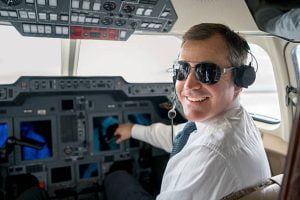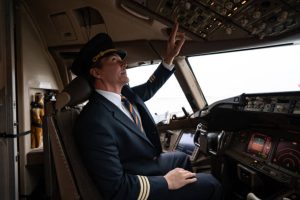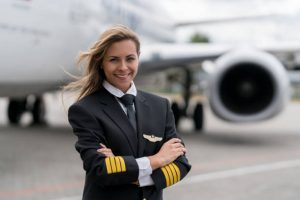If you are searching for how to become a commercial pilot without a degree, you’ve come to the right place!
For some time now, I’ve been receiving several questions from my blog readers asking me whether it’s possible to become a commercial pilot without a degree.
If you don’t have a degree but wish to become a commercial pilot, you may be wondering how possible this could be.
Well, the truth is that you can become a commercial pilot even if you don’t have a degree.
Interesting right? I guess! However, it demands careful preparation and planning.
While having a degree can be the cherry on top, it is not a prerequisite to becoming a commercial pilot.
If you don’t have a degree but wish to become a commercial pilot, do not lose hope, there are ways to go about it.
In this comprehensive guide, we shall take an in-depth look at how to become a commercial pilot without a degree as well as other crucial things you need to know.
Ready? Let’s dive in!
Also Read: How to Become a Teacher in Texas without a Degree
What Is a Commercial Pilot?

A commercial pilot is a licensed aviator who operates aircraft for pay.
They undergo specialized training and earn certifications, including a commercial pilot’s license after accumulating around 250 flight hours and passing exams.
Commercial pilots possess skills in aviation principles, navigation, communication, and emergency handling.
They can work in various roles, such as airline transport pilots (ATP) on commercial airliners, charter and cargo pilots, flight instructors, or agricultural pilots.
Safety is paramount, and they adhere to strict regulations and regular training.
Their work environments range from airlines to cargo companies, with varying schedules.
Advancement opportunities include progressing from first officers to captains.
Overall, commercial pilots ensure safe and efficient air travel while embracing a dynamic and challenging career.
Recommended: How to Become a Writer without a Degree
What Does a Commercial Pilot Do?

A commercial pilot is responsible for safely operating aircraft for financial compensation.
Their primary duties encompass:
1. Flight Operations
Commercial pilots are skilled in pre-flight preparations, including conducting aircraft checks, assessing weather conditions, and reviewing flight plans.
They ensure the aircraft is ready for departure and make decisions regarding flight routing, altitudes, and fuel requirements.
2. Takeoff and Landing
Pilots manage critical phases of flight, such as takeoff and landing.
They follow precise procedures to ensure smooth and safe operations during these phases.
3. Navigational Skills
Pilots navigate using instruments, charts, and GPS systems to maintain proper course and altitude.
They adjust for weather conditions and air traffic while communicating with air traffic control (ATC).
4. Communication
Effective communication with ATC and cabin crew is crucial.
Pilots relay important information, receive instructions, and report any issues or emergencies.
Also See: Can You Be a Social Worker with a Psychology Degree?
5. Emergency Response
In the event of mechanical problems, weather-related challenges, or other emergencies, pilots remain composed and implement appropriate procedures to ensure the safety of passengers, crew, and aircraft.
6. Passenger Safety
Commercial pilots prioritize passenger safety, ensuring passengers are secure and informed about safety procedures before takeoff.
They manage cabin conditions, such as temperature and pressure, for passenger comfort.
7. Decision-Making
Pilots make swift decisions based on a combination of experience, training, and information.
They assess factors like weather changes, engine performance, and potential hazards.
8. Aircraft Systems Management
Pilots monitor and manage various aircraft systems, including engines, hydraulics, and avionics, to ensure optimal performance throughout the flight.
9. Regulatory Compliance
Commercial pilots strictly adhere to aviation regulations set by their country’s aviation authority.
This includes maintaining proper documentation, flight records, and adhering to safety standards.
Also Read: Is a Psychology Degree Useless? (All You Should Know)
10. Continuous Training
Pilots engage in regular training sessions and simulations to stay current with industry advancements, refine their skills, and prepare for unexpected scenarios.
11. Long-Haul Responsibilities
For long-haul flights, pilots manage fatigue and employ strategies like crew rotation to ensure they remain alert and capable of handling their duties.
12. Team Collaboration
In multi-crew environments, pilots collaborate with co-pilots, cabin crew, and ground personnel to ensure seamless flight operations.
13. Passenger Interaction
Pilots occasionally interact with passengers during the flight, providing updates on weather, routing, and estimated arrival times.
Overall, a commercial pilot’s role revolves around safe and efficient aircraft operation, prioritizing passenger and crew well-being, adhering to regulations, and making informed decisions in various flight scenarios.
Recommended: Do You Need a Degree to Be an Accountant?
How to Become a Commercial Pilot without a Degree

If you don’t have a degree but wish to become a commercial pilot, here are the steps to follow:
1. High School Diploma or Equivalent
The journey to becoming a commercial pilot begins with a high school diploma or its equivalent.
This is the minimum educational requirement to kickstart your aviation career.
2. Research and Choose a Flight School
Now that you’re equipped with the necessary educational background, it’s time to research and select a flight school.
Look for schools with a good reputation, great training facilities, and a track record of successful pilot training.
3. Start Flight Training
Enrolling in a flight training program is where the real excitement begins.
You’ll dive into ground school lessons to understand the theoretical aspects of flying, and then you’ll actually take to the skies with a flight instructor to gain practical experience.
Also See: Can I Become a Chiropractor without a Degree?
4. Obtain a Private Pilot License (PPL)
After completing your initial training, you’ll work towards earning your Private Pilot License (PPL).
This license lets you fly for personal purposes and involves written exams and a practical test to demonstrate your flying skills.
5. Build Flight Hours
With your PPL in hand, you’re ready to gather flight hours.
This can be done by working as a flight instructor, towing banners, or taking up other entry-level aviation roles.
Building experience is a key step to move forward.
6. Obtain a Commercial Pilot License (CPL)
Once you’ve gained enough flight hours, it’s time to upgrade to a Commercial Pilot License (CPL).
This license enables you to fly for compensation.
You’ll need additional training, written exams, and a practical test to prove your proficiency.
7. Consider Specializations
Depending on your interests, you might want to explore specializations like instrument rating (IR) or multi-engine rating (ME).
These additional qualifications enhance your skillset and open up more employment opportunities.
Also Read: How to Become a Midwife without a Nursing Degree
8. Network and Job Search
Building a network within the aviation community is crucial.
Attend aviation events, make friends with fellow pilots, and stay updated on job openings.
Entry-level positions in cargo or regional airlines could be your stepping stones.
9. Airline Transport Pilot License (ATPL)
While not always required, an Airline Transport Pilot License (ATPL) is the pinnacle of pilot certification.
Some airlines might prefer candidates with an ATPL due to its comprehensive requirements, including a minimum number of flight hours.
10. Continuous Training and Progression
Aviation is an ever-evolving field.
Pilots need to undergo recurrent training to stay current with regulations and advancements.
As you gain more experience, you’ll have the chance to move up to larger aircraft and more prestigious roles.
Remember, while a college degree might not be obligatory, some airlines might value it.
However, your dedication, skills, and passion for flying are what will truly set you apart as you embark on your exciting journey to becoming a commercial pilot.
Recommended: How to Become a Graphic Designer without a Degree
Necessary Skills Every Commercial Pilot Should Have
As a commercial pilot, there are certain essential skills you must possess.
Let’s explore some of the necessary skills every commercial pilot should have.
1. Flight Skills and Knowledge
As a commercial pilot, you’ll need to be a master of aviation know-how.
This means understanding the nitty-gritty of aerodynamics, meteorology, navigation, and aircraft systems.
It’s like having a backstage pass to the mechanics of flight.
These skills will guide you through smooth takeoffs, precise landings, and handling various in-flight maneuvers.
2. Aircraft Handling and Navigation
Think of yourself as the captain of a ship but in the skies.
You need a knack for handling the aircraft with finesse.
Your hand-eye coordination should be top-notch, allowing you to navigate through the skies confidently.
From taxiing on the runway to soaring at cruising altitude, you’ll be in command.
3. Decision-Making under Pressure
Imagine this: you’re up in the air, and something unexpected happens.
That’s when your decision-making skills come into play.
The ability to stay cool under pressure and make quick, informed decisions can be the difference between a safe landing and a crisis.
It’s all about relying on your training and experience to guide you.
4. Situational Awareness
Picture yourself in the cockpit, scanning instruments and checking your surroundings.
This is situational awareness – knowing where you are, what’s happening around you, and what’s coming up.
It’s like playing chess in 3D.
This skill helps you foresee challenges and respond proactively.
Also See: How to Become a Real Estate Agent without a Degree
5. Communication Skills
Here’s where your smooth talking comes in.
You’ll be in touch with air traffic control, fellow crew members, and even passengers.
Clarity and precision are your best friends when conveying critical information.
Your voice will be a guiding light in the skies.
6. Problem-Solving Skills
Every now and then, you might encounter a hiccup in the plan – a technical glitch, weather changes, or other surprises.
Your problem-solving skills will kick in as you troubleshoot and come up with solutions.
Consider it like being a detective in the air, solving puzzles to keep the flight on track.
7. Leadership and Teamwork
Flying isn’t a solo act, especially in commercial aviation. If you’re part of a crew, teamwork is essential.
It’s like being a conductor in an orchestra, ensuring everyone’s playing their part harmoniously.
You might also need to step up as a leader when coordinating tasks and decisions.
8. Attention to Detail
Being a pilot is a blend of excitement and precision.
You’ll rely on checklists and procedures to ensure that every detail is in place.
It’s like being a chef following a recipe – each step matters.
Small oversights can lead to big consequences, so meticulousness is key.
Recommended: How Long Does It Take to Get a Business Degree?
9. Adaptability
Think of the skies as a dynamic canvas that’s always changing.
Weather, schedules, and unexpected situations can throw curveballs.
Adaptability is your secret weapon.
Being able to adjust your plan on the fly is essential to ensuring a smooth journey.
10. Resilience and Stress Management
The skies can test your mettle. Long flights, weather challenges, and unexpected issues can be taxing.
Resilience and stress management skills help you stay composed and focused even when things get tough.
11. Regulatory Knowledge
Navigating through aviation regulations is like reading the rulebook of the skies.
It’s important to understand and adhere to the guidelines set by aviation authorities.
Compliance keeps you and everyone else safe and ensures a legally sound flight.
12. Customer Service
If you’re piloting commercial airliners, you’re not just flying a machine – you’re responsible for the people onboard.
Good customer service skills come into play when interacting with passengers.
Making them feel comfortable and secure contributes to a positive flying experience.
Remember, these skills aren’t developed overnight.
Becoming a commercial pilot requires intensive flight training, and building experience over time.
It’s a journey that demands continuous learning and a passion for aviation.
So, if you’re ready to soar, buckle up and get ready to embrace the exciting world of commercial aviation!
Also See: 10 Tips on How to Get a First Class Degree in Nursing Science in Nigeria
How Much Do Commercial Pilots Make?
Commercial pilots’ salaries can vary a lot.
New pilots just starting out might earn around $25,000 to $60,000 a year.
As they gain experience and move up the ladder, mid-level pilots could make $60,000 to $120,000 annually.
Now, experienced captains who fly bigger planes and have lots of hours can rake in anywhere from $100,000 to $250,000 or more.
Keep in mind, the type of aircraft, the airline, and where they’re based play a role.
Benefits like health coverage, retirement plans, and travel perks also sweeten the deal.
Unions and seniority can influence pay too.
And if you’re freelancing or working on a contract, things might be a bit different.
Just remember, these figures give you a general idea – the aviation world can be a bit up-and-down!
Also Read: What Can I Do with a Computer Science Degree in Nigeria?
Frequently Asked Questions (FAQ)
What Is the Age Limit for Commercial Pilots?
The age limit for commercial pilots isn’t set in stone and can vary.
You can start with a private pilot’s license at 17. To fly as a commercial pilot, you generally need to be 18.
Airlines have their own rules, hiring first officers around 21 or older.
Remember, there’s also a retirement age, usually around 65.
But, these rules can shift, so it’s smart to check with local aviation authorities and airlines for the latest age details and job openings.
How Hard Is It to Become a Commercial Airline Pilot?
Becoming a commercial airline pilot isn’t a piece of cake, but it’s doable and pretty cool.
You start with a high school diploma, then dive into pilot training at a legit flight school.
Think of it as a mix of hitting the books and racking up flight hours.
You’ll snag licenses like the private pilot’s, nail written and practical exams, and gather experience through teaching or regional airlines.
It’s an investment of time and money, and you’ve got to stay healthy and skilled.
It’s like a journey, with ups and downs, but if you’re up for the challenge and put in the effort, you can totally make it as a commercial pilot.
How Do I Start a Career As a Commercial Pilot?
Starting a career as a commercial pilot is exciting. First, get your high school diploma.
Look for a good flight school approved by aviation authorities.
Join a pilot training program that covers both ground and flight training.
You’ll start with a private pilot’s license, then add an instrument rating and a commercial pilot’s license.
These licenses let you fly for pay.
Get those flight hours by being an instructor or doing scenic flights. Pass written and practical exams.
Network in the aviation field and apply to regional airlines or corporate flying jobs.
As you gain experience, you can move up to bigger airlines.
Just stay committed, keep improving, and meet the medical and training requirements.
What Is the Difference Between Airline Pilot and Commercial Pilot?
An airline pilot and a commercial pilot have distinct roles.
A commercial pilot can be paid for flying, like with banner towing or crop dusting.
They usually need a commercial pilot’s license (CPL) which involves training, flight hours, and passing exams.
On the other hand, an airline pilot operates large aircraft for scheduled airlines.
They need an Airline Transport Pilot License (ATPL), a step up from CPL.
ATPL requires more flight hours, experience, and adherence to strict medical and skill standards.
In short, a commercial pilot flies for money, while an airline pilot is at the helm of big passenger planes, demanding further qualifications and experience due to the complexity and responsibility of the role.
Can a Commercial Pilot Fly Any Plane?
Think of a commercial pilot as having a diverse toolbox, but not every tool fits every job.
They’re trained to fly different planes, but there’s a catch.
The types of planes they can handle depend on their ratings and endorsements.
Starting small, they can move up the ladder.
Yet, flying bigger or trickier aircraft might need extra training, like getting a special “type rating” for jets.
So, while they’re not locked to one plane, their toolkit’s shape depends on their qualifications.
Commercial pilots have range, but the specific planes they can pilot have a bit of a rulebook to follow.
Recommended: What Can I Do with a Computer Engineering Degree in Nigeria?
Conclusion
Even if you don’t have a degree, you can still become a commercial pilot.
I’m not trying to say that a degree is not important, no, not at all!
All am trying to say is that do not let not having a degree stop you from achieving your commercial pilot dreams as there are alternative paths you can explore.
In this article, I’ve shown you how to become a commercial pilot without a degree.
By following all the steps we discussed here, you can set up yourself for success in the aviation industry despite not having a degree.
If you have any questions or inquiries, ensure to drop them in the comment section and I will respond right away.
Good luck!
Related Posts:
- 20 Degree Courses with Best Employment Opportunities in Nigeria
- 10 Tips on How to Get a First Class Degree in Law in Nigeria
- 10 Sports Scholarships in the USA for International Students
- 10 Public Health Scholarships for International Students in the USA
- 10 Fully Funded Nursing Scholarships for International Students in Canada
- 15 Best MBA Scholarships for Women
- 10 Canadian Scholarships for Nigerian Students
- Which Is Better Architecture or Civil Engineering in Nigeria?
- Which Is Better Medicine or Pharmacy in Nigeria?
- How Many Years Does It Take to Study Pharmacy in Nigeria?
- Can a Nigerian Pharmacist Work in the UK?
- Where Can I Work If I Study Pharmacy in Nigeria?
- Can a Nigerian Pharmacist Work in the USA?
- Is Pharmacy a Good Course to Study in Nigeria?